You know that you have hard water and you also can see some discoloration in the water in your home. You have seen advertisements for all kinds of water softeners and water filters, but how do you know if you need a water filter or a water softener?
A water sediment filter removes particles from your water that can clog faucet screens and showerheads and needs to be cleaned or replaced regularly. A water softener repeatedly removes hard ions that can build-up in your plumbing and leave white spotting on your water fixtures and appliances.
There are many impurities that can be found in your water, and there is no, one water treatment system that fits all solution to your water issues. A water filter can improve your water in many ways, but it is not a water softener, and a water softener does not actually filter your water.
What is the difference between a water filter and a water softener?
A water filter removes particles and sediment from your water and needs to be changed or cleaned when they become full.
Water softeners remove hard ions from water through the process of ion exchange and are able to continue to remove hard ions by regenerating its water softener resin rather than replacing it.
Both water filters and water softeners remove unwanted impurities from your water, but there are many impurities that a water filter will remove that a water softener will not, and most water filters will not remove the same impurities that a water softener will.
A water filter captures impurities in its filtering material or media to remove the impurities from your water.
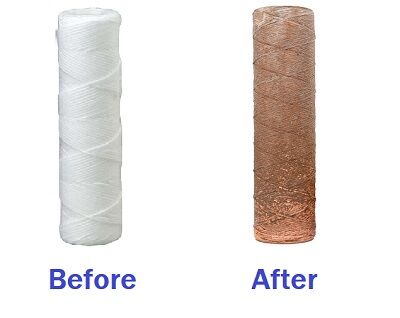
Filtering water has been around for as long as the water has traveled over and through the earth. When passing over and through different substances in the earth, water can be filtered of impurities making it healthier and more beneficial for us to drink.
But as water travels through some substances in the earth, it can also pick up many types of unwanted impurities that can make water less effective for cleaning, smell bad, taste bad, and even make it very unhealthy for us to consume.
Are all water filters the same? Absolutely Not!
Different types of water filters use different substances to remove or reduce impurities from your water, but one type of water filter does not necessarily help with multiple impurities in your water.
A water filter may consist of a simple mesh that is designed to filter out large sediment or other small particles from your water.
Using a water filter that is designed to filter out large particles will provide better water flow while filtering out large sediment, but smaller impurities will be able to pass through the filter as well as the water.
A 5-micron water filter that is designed to filter out particles that are very small will also restrict the flow of water going through the filter more than a 50-micron sediment filter that is for larger particles.
Are there filters to remove odors from water?
Some filters use activated charcoal to capture tiny particles that can not be filtered out using a standard mesh filter. Chemicals like chlorine and gasses like Hydrogen Sulfide (Sulfur) can effectively be filtered from your water by using an activated charcoal water filter.
A water filter can be simple bedding of sand that filters out debris from your water, a coffee maker may use a paper filter to hold the coffee grounds while water is running over the grounds to make our coffee, and a water filtering pitcher uses a filtering cartridge to remove tiny particles of chemicals and gasses from your water.
Unlike a sediment filter, a water softener removes hard mineral ions from water.
A water softener holds hard ions inside of its tank that it has removed from your water and then it rinses them away so it can continue to remove more hard ions from your water.
Check out this quick video on how a water softener removes hard ions from your water.
A water softener uses bedding of water softener resin which uses a process called ion exchange to attract hard ions from your water to the water softener resin where the hard ions cling to the resin until sodium ions replace the hard ions on the resin in the regeneration process, and the hard ions are rinsed away.
Essentially, a water softener does not capture and hold hard minerals like a filter would, instead, it holds the hard ions onto its water softener resin a bit like when you rub a balloon on your hair to make the balloon stick to the ceiling.
After the water softener resin has removed as many hard ions as it has the capacity to hold, the water softener passes sodium ions over the water softener resin and the sodium ions replace the hard ions and the hard ions get rinsed away to a drain.
Different types of water filters, and how they can improve your water.
But first, a quick lesson on “Microns”.
A Micron is a length of measurement equal to one-millionth of one meter. It is a very tiny measurement often used in the description of water filtering cartridges to identify how small of a particle the filter cartridge will be able to filter out of water passing through the filter material.
To put it simply, the lower the micron rating of a filter, the smaller the particles that it can filter out. When talking about water filters, a 5-micron water filter cartridge will remove smaller particles than a 50-micron filter cartridge.
Sediment filters:
The most common type of whole house water filter cartridge is for the filtering of sediment that can come up from well water.
Dirt, grit, sediment, and other debris can be drawn up from your well and get into your home clogging faucets, showers, and other water fixtures and appliances in your home.
Using a whole house sediment filter will remove this sediment from your water and is usually installed right after the water storage pressure tank in your home to protect everything in your home from unwanted sediment.
Not all sediment filter cartridges are created equal! What water filter do you need?
There are different types, sizes, and filtration levels of sediment filter cartridges that can be used for different types of sediment depending on the amount of sediment in your water, and how much volume of water is used.
Let’s take a look at the most common types of sediment filters that you would need for removing sediment from your water.
Pleated sediment filters:
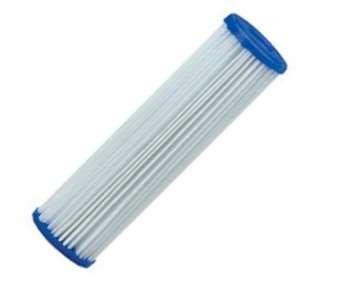
The major benefit of a pleated sediment filter is the substantially more filtering surface area of the filter.
When sediment is a problem in your water, you want to filter out the sediment, but you also don’t want to have to change the water filter cartridge every week because the surface area of a standard filter cartridge gets covered very quickly, and restricts the water flow to your home.
A standard 2.5 diameter by 10-inch pleated sediment filter has over 4 square feet of surface area to capture sediment from your water, and a larger 4.5 diameter by 10-inch pleated filter cartridge has over 16 square feet of filtering surface.
This larger surface area means better flow of water through the filter and much more sediment can be filtered out which means more time between filter changes.
Pleated cellulose filter cartridges are relatively inexpensive but they should only be used once before being replaced, while a pleated “Polyester” filter cartridge is very durable and can be rinsed off and reused several times before it needs to be replaced in many cases.
Pleated Cellulose sediment filter
A pleated cellulose (Paper) sediment filter is fine for filtering out light sediment when dirt or very fine particles from your water will clog the pores of the filter and make it not reusable.
A cellulose filter is also not as durable as a polyester filter cartridge and the cellulose surface can tear more easily from sharp edges and high water pressure.
Pleated Cellulose/Polyester sediment filter:
The Cellulose/Polyester material blend gives the filtering surface area more durability to withstand more wear and tear than a cellulose filter cartridge while still keeping the price down.
Pleated Polyester (Reusable) sediment filter:
For a few dollars more, you can use a pleated polyester filter cartridge which is reusable several times before it needs to be replaced in many cases.
Its more durable surface is also much better if the sediment in your water consists of debris with sharp edges that could easily cut into a weaker cellulose filter cartridge.
I highly recommend using a Pleated Polyester filter cartridge for most sediment filtering applications because they can be rinsed off and reused, and they don’t cost very much more than a cellulose filter cartridge.
Pleated Polyester/Carbon sediment filter:
Like a regular pleated polyester water filter cartridge, a pleated Polyester/Carbon sediment filter cartridge has increased filtering surface area for less frequent changes but they also have carbon embedded into the fibers of the surface to help reduce odors in your water and reduce fine particles in your water that can cause poor tasting water.
The amount of carbon in a pleated Polyester/Carbon sediment filter is minimal and will not be as effective as an Activated Carbon filter cartridge for long-lasting filtering of impurities that can cause poor tasting water or odors.
Spun-Polypropylene sediment filters:
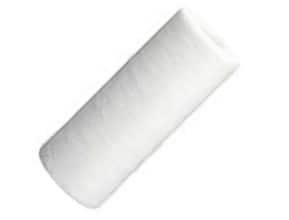
A Spun-Polypropylene filter is a solid-looking filter cartridge that contains many small pores to capture fine sediment while also filtering out larger sediment on the filter’s outer surface.
Spun Polypropylene standard sediment filter:
While a Spun-Polypropylene filter cartridge does not allow as much water flow as a pleated filter, they are better at removing finer particles that would often flow through a pleated filter cartridge.
The denser Spun-Polypropylene filter will often have to be changed more often than a pleated filter but if fine sediment is a problem, they are very effective.
Spun Polypropylene Dual Gradient sediment filter:
A Dual Gradient filter cartridge uses a less dense outer layer to filter out larger sediment and a finer center filtering layer to remove finer particles from your water without having to use two separate filter cartridges and allows for better water flow than you would have if you were to use just a fine particle sediment filter cartridge.
Spun Polypropylene – High Flow sediment filter:
A Spun Polypropylene High Flow sediment cartridge has the ability to filter out very fine particles just like a standard Spun Polypropylene filter cartridge but there are more pores in the filter surface to allow higher water flow through the surface.
Spun Polypropylene – String-Wound sediment filter:
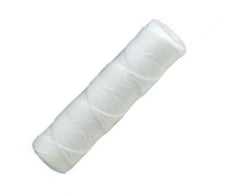
By using a Polypropylene cord that is spun in a very consistent pattern, a Spun Polypropylene – String-Wound sediment filter is able to filter out lots of very fine particles and hold them in the space between the string cord.
Spun Polypropylene – String-Wound sediment filters are an economical way to filter out different sized particles from water while maintaining minimal water restriction.
Bag Sediment Filters:
A Bag type water filter is used mostly for larger debris in the water that would normally clog a standard cartridge type filter very quickly. The bag filter captures debris and can often be emptied and cleaned to be used over and over again.
Carbon filter cartridges for taste and odor:
Some filter cartridges can remove sediment and also improve the taste of your water as well as reduce unpleasant odors in your water. These filter cartridges contain carbon to filter out fine particles and chemicals from your water that can affect the taste and odor of your water.
Carbon Block Filters:
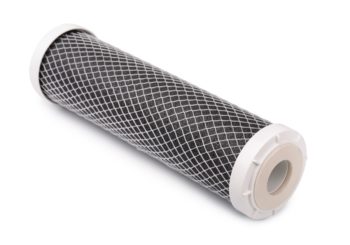
Carbon Block filters are filters that have had carbon and other filtering media embedded into the material of the filter to reduce odd taste or odors from your water but are also used in the reduction of Chloramines, Cysts, Chemicals, and even Lead from your water.
They are commonly used for mild odor removal and can be very effective for improving the taste of water by reducing or removing chemicals in your water.
Granular Activated Carbon Filters:
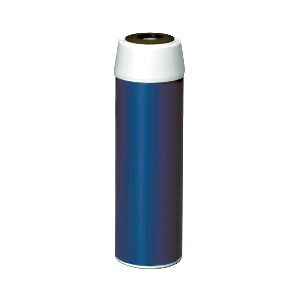
A Granular Activated Carbon Filter contains a chamber of carbon inside of them which allows for more contact with the water flowing through the cartridge for more efficient removal of fine particles like chemicals that can cause odors in your water and odd tastes.
A Granular Activated Carbon Filter or (GAC) filter cartridge comes in standard sizes that can be used in place of sediment filters for light sediment when odors or poor taste in your water are also issues.
What a water softener does, and how it improves your water.
Unlike a water filter that is used to remove sediment, fine particles, or even poor taste and odors from your water, a water softener has one specific purpose, to remove hard ions like calcium, magnesium, manganese, and iron.
These hard minerals can leave spotting when the water evaporates. These spots are commonly know as hard water stains, but these minerals can be remove from your water before they create hard water stains.
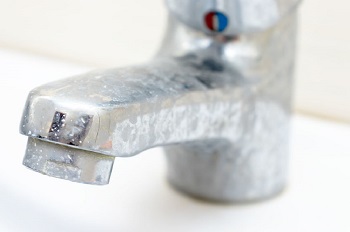
To do this, a water softener uses a process called ion exchange to pull hard ions from the water and hold them on its water softener resin until the water softener regenerates its water softener resin and rinses the hard ions away.
A water softener is not actually a filter although the resin inside of a water softener can filter out some larger sediment from your water.
See my article Does A Water Softener Filter Water?
Water going through a water softener removes the hard ions which can cause spots on your water fixtures, dishes, silverware, and cause your appliances that use water to fail or work less efficiently.
When is a water filter needed along with a water softener?
Sediment and debris in your water can get inside of your water softener causing openings to get clogged, moving parts to jam and restricted water flow through the water softener resin inside of your water softener.
Can A Water Softener Get Clogged?
Non-electric water softeners that rely exclusively on steady and consistent water flowing through them to work properly often require an external water pre-filter to prevent debris from entering the control valve and cause the entire system to stop working.
Even standard electric water softeners may need a water pre-filter to protect its moving parts and water softener resin if there is a high amount of debris and sediment in your water.
Why it is a good idea to use a reverse osmosis water filter to filter your drinking water after it has gone through your water softener?
Although a properly operating water softener will not add a significant amount of sodium to your drinking water, there can be more sodium in your drinking water after a water softener regenerates.
Using a reverse osmosis drinking water system will not only remove any additional sodium from your water that has been left over from your water softener after it has regenerated, but it can also reduce all dissolved solids like sodium in your water by up to 98%.
You may need a large water filter, but only a small water softener, or vise versa.
Since the amount of hardness in your water can vary from one home to another, and the amount and type of sediment from a well can be very different from one well to another, a one size water softener and water filter fits all approach is not always a good decision.
What a water filter needs to filter out of your water should be considered separately from what a water softener needs to remove from your water.
Take into consideration how much water sediment or other issues in your water needs to be addressed by a water filter, and then consider the hardness and iron issues in your water that a water softener will need to remove.
So, how do I know if I need a water filter or a water softener?
If you have mild odors in your water, your water has an odd or bad taste to it, or if you can see little bits of sediment or dirt in your water, the correct water filter will be needed.
If you can’t get your soap and shampoo to lather well, your clothes look dingy, and your hair is stringy and unmanageable, you most likely have hard water which can be softened by using a water softener.
Test your water for hardness and iron to determine what size water softener would be best for the amount of water that you would expect to be using in your situation.
Then take a sample of your water and examine it in a light-colored container to observe what kind of sediment or debris is present in your water to determine what size and type of water filter that you will need for your water.
You may need a water filter as well as a water softener if you have an ultraviolet water purifier.
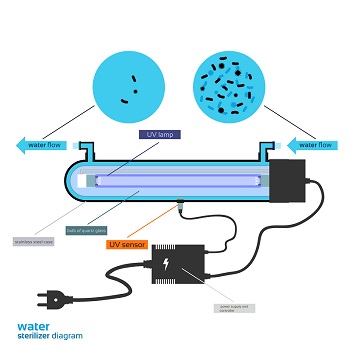
An ultraviolet water purifier requires its light to effectively get through a clear quartz tube for it to do its job.
If this clear tube becomes etched by hard water or iron or gets stained by impurities in your water, the light that is intended to purify your water will not get exposed to your water and therefore, your water will be unaffected by the ultraviolet light.
The water going through an ultraviolet water purifier should be softened and sediment-free.
If you have sediment in your water, you should have a sediment water filter to remove any sediment that could affect the performance of your ultraviolet water purifier. And if you have hard water or iron in your water, you should have a water softener to soften the water going through your ultraviolet water purifier.
Water filters are used before a water softener, and sometimes after a water softener.
Most water treatment situations call for a water pre-filter to be installed before a water softener so that any sediment or debris from the water can be removed before it gets into the water softener, but in some cases, a water filter may be installed after a water filter to be used as a “polishing” filter.
A polishing filter is a filter used to give your water a final “polish” or touch-up filtering. You may install a very fine polishing filter after a water softener if there is a high amount of sediment or iron in your water that may not get completely removed by a water pre-filter or by the water softener.
Where odors or odd tastes in your water are a problem, installing an Activated Carbon post-filter (after the water softener) may be installed to remove fine particles in the water that a normal sediment pre-filter is not able to remove from the water.
In some cases, a polishing filter may be install after a water softener when there is an ultraviolet water purifier to make sure that the water going through the ultraviolet purifier is free of particles that may cause discoloration or wear on the quarts tube that contains the ultraviolet lamp.
What water softener will work best for you?
Not everybody needs a big expensive water softener with multiple tanks and a fancy control that uses the latest tech so you can monitor your water softener from your smartphone when you are away on vacation.
Yes, you can actually operate some water softeners with your smartphone!
If you think that you need to know exactly when your water softener is regenerating, then go ahead and spend a bunch of money on that feature, but if you are just looking for a high-quality water softener that will soften your water and last for many years, then you should consider the correct size standard water softener for your water and water usage.
Here are some common impurities that can be removed from water using various water filters or a water softener.
| Impurity | Sediment Filter | Carbon Filter | Reverse Osmosis System | Water Softening System |
| Sand | YES | YES* | ||
| Dirt | YES | YES* | ||
| Sediment | YES | YES* | ||
| Clay | YES | YES* | ||
| Non-Dissolved Iron | YES | YES* | ||
| Dissolved Iron | YES* | YES | ||
| Calcium | YES* | YES | ||
| Manganese | YES* | YES | ||
| Sodium | YES | |||
| Heavy Metals | YES | YES | ||
| Chlorine | YES | YES* | YES | |
| Particles Causing Odor | YES | YES | ||
| Particles Causing Poor Taste | YES | YES |
- *Although many reverse osmosis systems are able to remove these impurities, they should be removed prior to the reverse osmosis system to prevent clogging of the reverse osmosis filters and possible dammage to the reverse osmosis membrane.
So, do I need a water filter or a water softener?
Hard water is a common problem that can be corrected with a water softener. Hard water and dissolved (Ferous) iron can be removed from your water using the correct size and type of water softener for your needs.
Sediment, dirt, chemicals, and other small particles that can be found in your water can often be removed by using the correct type of water filter.
A water filter is very different from a water softener and a water softener is not meant to be a water filter.
Make sure that you understand the difference and choose the right filter and water softener that you need and your water will be soft, iron-free, and free of unwanted impurities making it better for you and your home.


do you have any thoughts on kinetico hollow carbon whole home filter?
they are trying to sell for $1499 on top of the softener for $3000. Not sure if I really need it
Hello Neo and thank you for the question.
Carbon whole house water filters are usually used to remove chlorine from municipal water or to remove odors and chemicals that can cause your water to taste bad. If none of these apply to you, you probably do not need a carbon filter at all.
Why did the salesperson say that you should get a carbon filter?
Also, Kinetico’s whole house carbon filters work much like any other whole house carbon filters that are much less expensive.
I recommend Tier 1 Carbon filters for their price and because they use a Fleck control valve which is my personal favorite.
I have highly recommended the Waterdrop reverse osmosis systems for many years now and have not found any reasons not to recommend them.
They are very reliable and the filters are very easy to change. The price is very reasonable and they have great reviews.
I hope this was helpful!
Paul